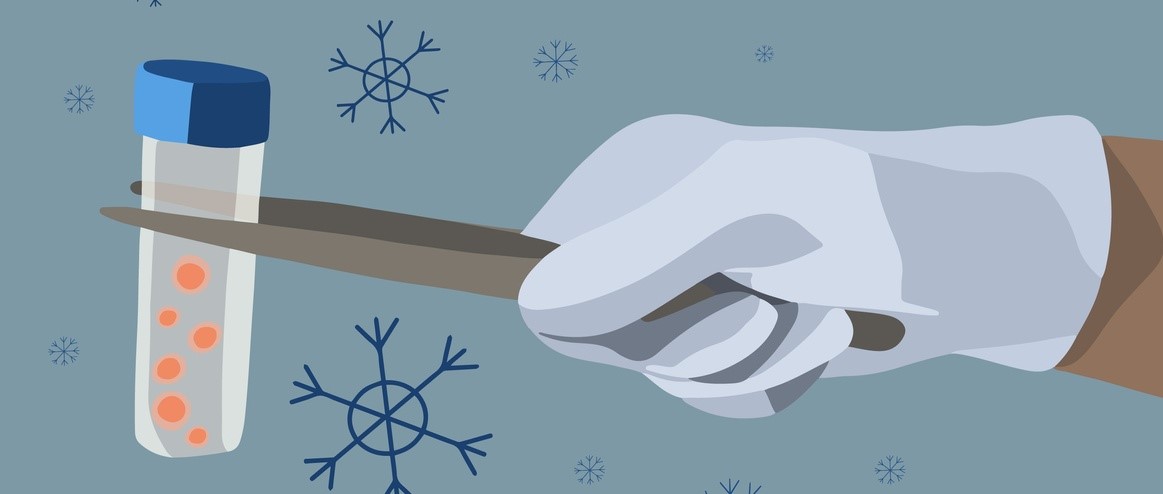
Why is egg freezing on the rise and is it safe?
Peer reviewed by Dr Krishna Vakharia, MRCGPAuthored by Amberley DavisOriginally published 13 Apr 2023
Meets Patient’s editorial guidelines
- DownloadDownload
- Share
- Language
- Discussion
- Audio Version
In the last decade, the number of women choosing to freeze their eggs has increased tenfold. Egg freezing can offer a great opportunity, but it isn't a fail-safe insurance policy against age-related infertility. To help women decide whether this treatment is right for them and their bodies, they need clarity around egg freezing risks, success rates, and other physical, emotional, and financial factors.
In this article:
Video picks for Fertility
Continue reading below
Why do people freeze their eggs?
Egg freezing has come a long way since the 1980s. What started out as a procedure for women undergoing fertility-compromising medical treatments, is now building a reputation as the modern women's childbearing insurance policy.
As women age, both the number and quality of their eggs decline - and with this their chances of getting pregnant. Egg freezing - medically known as oocyte cryopreservation - is a type of fertility preservation used by women who wish to preserve some of their eggs to use in the future.
This is done by stimulating a woman's ovaries with IVF drugs to produce more eggs, collecting these eggs, cooling them to sub-zero temperatures to preserve them, and storing them in a lab.
Why is egg freezing on the rise?
Back to contentsDespite recent improvements in its technology, egg freezing remains an expensive procedure that cannot guarantee you a child. It's an emotional and financial gamble, but for many, it's also an opportunity to gain more control in their lives. For fertility specialist Dr Jane Frederick, egg freezing can provide more freedom of choice for women:
"Birth control has given women the choice whether to have a baby. Egg freezing can give them the choice of when to have one."
The most recent report from the Human Fertilisation and Embryology Authority (HFEA) shows the shift in how egg freezing has been used in the last decade1:
Frozen egg transfers increased by 86% from 2014 to 2019.
The use of egg freezing has increased tenfold in the past 10 years, increasing from 230 to 2,400 annual procedures from 2009 to 2019.
What was once used almost exclusively for medical reasons - for example by transgender men before fertility-altering transitional treatments or by women with a family history of early menopause - is now appealing to many more people, for a wider range of motivations.
Dr Frederick believes a combination of the following are contributing to egg freezing's rise in popularity:
In the last 10-15 years, egg freezing technology has improved success rates.
Women are reading and hearing more about how they are born with a finite number of eggs that they lose every month until menopause. Knowing this, more are being proactive in their fertility choices.
There is a cultural shift where more and more women are entering their mid-thirties before deciding if they want children.
Social egg freezing
An increasing number of women freezing their eggs are motivated by the need for more time. Specifically, more time in their thirties - when their fertility begins to decline - to establish their careers, secure financial stability, find the right partner, or simply enjoy the freedom of being childless for a while longer. These kinds of reasons - influenced by culture, society, and economy - have been labelled social egg freezing.
Vicky is a 28-year-old production coordinator living in London. Like many young professionals in the city, she leads a busy life. Looking ahead to her thirties, she's wondering how she might delay her decision to start a family.
"I first talked about egg freezing with my boyfriend after we'd heard that a mutual friend was doing it. It piqued our interest enough to research into the procedure. I think there's an assumption that it's just women making decisions about future fertility, but these choices are often being made with partners.
"Being in London, most of my friends in their late twenties are in a similar position - either feeling unsure if they want children in the future, or wanting to prolong their child-free years while other areas of their life thrive and are prioritised.
"Egg freezing could be a way to free many women from the fear of infertility - especially if around age 30 they aren't professionally or romantically in a place to have children. Fertility may not dramatically fall at 30, but this age is seen as such a benchmark by our generation.
"This procedure could be liberating for me - but first I need to find out the egg freezing risks, and whether it's actually financially viable."
With more people considering egg freezing than ever before, it's important everyone has the opportunity to weigh up the egg freezing risks, considerations, and chances of having a baby this way.
Continue reading below
The success rate
Back to contentsEveryone's bodies are different - two women of the same age can have a different number of eggs, and these eggs can vary in quality. However, scientists can work out the average success rates of egg freezing for the general population based on:
The age you were when your eggs were frozen.
How many eggs were successfully frozen and thawed.
What the evidence says2
Under 35-year-olds | who freeze 8 - 10 eggs | 5 out of 10 will have a live birth |
Under 35-year-olds | who freeze 10 - 15 eggs | 8 or 9 out of 10 will have a live birth |
Over 35-year-olds | who freeze 8 - 10 eggs | 2 or 3 out of 10 will have a live birth |
Over 35-year-olds | who freeze 10 - 15 eggs | 3 or 4 out of 10 will have a live birth |
Under 38-year-olds | who freeze 20 eggs | 7 out of 10 will have a live birth |
What the experts say
"The earlier you freeze your eggs, the better," explains Dr Frederick. "Generally speaking, if you freeze at least 20 eggs before age 38, data shows you have around a 70% chance of one turning into a baby2 - and sometimes you get more than one. I wouldn't recommend freezing your eggs if you're over 40. There's not much success after this age."
What are the health risks of egg freezing?
Back to contentsIs egg freezing safe?
Egg freezing is generally considered safe. Most women are no more likely to develop health problems than those who get pregnant naturally. However, as with all fertility treatments, there are some risks:
Mild side effects from IVF treatment drugs used in egg freezing to first stimulate egg production - for example, headaches, hot flushes, feeling restless, and low mood.
Serious side effects from IVF drugs - ovarian hyperstimulation syndrome (OHSS) is where your ovaries swell due to over-stimulation. It's very rare and usually treatable, but up to three people in every 100 experience life-threatening OHSS2. The symptoms of OHSS are: tummy pain and bloating, feeling sick, being sick, feeling faint, and shortness of breath.
Complications from egg retrieval - in rare occasions, the needle used in this procedure can cause infection, bleeding, or damage to the bladder or bowel.
Egg freezing: what's the physical toll?
It's important to consider that even when the treatment goes to plan, egg freezing can still take a physical toll on your body:
Hormonal drugs
Before your eggs can be collected, your ovaries are stimulated to produce more of them. This is done by injecting IVF hormone medication using a needle - usually for around two weeks. About one-third of people will experience side effects from these drugs, including mood swings, headaches, hot or cold flushes, insomnia, or bloating. The needle is injected several times, so it's also possible for this area of skin to become slightly bruised.
Egg retrieval surgery
"Surgery is minimally invasive and carries a less than 1% risk," says Dr Frederick. Indeed, the word surgery may sound scary, but the procedure involves no cuts or stitches and typically takes less than half an hour. After you have been given anaesthesia, a needle containing a suction device is inserted through the vagina. You shouldn't drive for 24 hours, and in the following days to weeks, you may experience tummy cramps, bloating, constipation, and spotting.
Less often, you may experience pain that requires stronger medication than ibuprofen. Contact your doctor if the pain is intense or if you're being sick - this could be a severe reaction to anaesthesia.
Pregnancy risks in older women
Many women use egg freezing to delay pregnancy until their late thirties and sometimes early forties - an age where pregnancy carries a higher risk of complications, including miscarriage, ectopic pregnancy, gestational diabetes, and early birth. While getting pregnant from previously frozen eggs doesn't increase these risks, neither does it reduce these risks - despite these eggs being frozen when younger.
Multiple births
While naturally conceived twins make up 2% of the population, 43% of babies born as a result of fertility treatment are twins - and 3% are triplets or larger3. There are important health considerations for multiple births:
Pregnancy complications are twice as likely - pre-eclampsia, for example, a dangerous high blood pressure condition.
Almost 60% of twins and 90% of triplets are born early4 - premature births can be life-threatening for babies or may result in long-term physical or mental disabilities.
Egg freezing: what’s the emotional toll?
Dr Frederick has experienced first-hand how positive the process can feel: "So many of my patients are relieved. I've helped them lessen the burden of the biological clock."
However, no matter how well you research the success rates, trying to become pregnant from your frozen eggs involves a lot of hope and emotion. When it doesn't work it can be very hard, and it's important to have support, whether from a partner, family member, or friend.
Continue reading below
Costs and clinic transparency
Back to contentsAs egg freezing rapidly becomes a highly commercialised and popular business, the HFEA has expressed concern over the marketing tactics and lack of transparency in many UK clinics5.
It describes the need for new legislation that better protects the physical, mental, and financial wellbeing of people choosing this treatment. Many people have reported that they were not made fully aware of the egg freezing risks or how much it would cost overall. The use of upfront and pay-as-you-go payment plans have been masking hidden costs - such as annual egg storage fees - in many clinics across the UK.
The HFEA recommends getting a full costed treatment plan from your clinic, so you're not caught out by unexpected extras.
Average prices in 2023 of each phase6:
£3,350 to have your eggs collected and frozen.
£500 - £1,500 for medication.
£125 - £350 in storage fees per year.
£2,500 to thaw and transfer the eggs to the womb.
This makes the whole process of egg freezing, thawing, and transferring to your womb cost an average of £7,000 - £8,000. But the lack of regulation also means there's a large pricing discrepency between UK clinics.
For Vicky, the current questions around regulation and financial transparency have led her to pause her decision to freeze her eggs: "I've heard of some people paying £10,000 extra than they expected. At 28, I feel I have a few years to think about it - the hope would be that within this time, more regulations are introduced in the UK."
Dr Frederick's tips for finding the best clinic
Back to contentsThe fertility specialist shares her advice for finding a trustworthy clinic:
Really investigate each clinic - not everyone has the right expertise.
Look for transparency around success rates - there can be a lot of variety between labs and not all clinics produce the same results.
Look for experience in clinic specialists.
Look for transparency around costs - are the prices on the clinic's website? Does this include their long-term storage fees?
If you're struggling with what to do, Dr Frederick says: "a good place to start is to speak to a specialist to get more information on your own body's current fertility. They can test your egg reserve and then talk you through your options."
Further reading
Back to contentsHuman Fertilisation and Embryology Authority: Fertility treatment 2019 trends and figures.
Alteri et al: Elective egg freezing without medical indications.
Sunderarm et al: Assisted reproductive technology surveillance - United States, 2011.
American Pregnancy Association: Complications in a multiples pregnancy.
Human Fertilisation and Embryology Authority: Fertility law needs modernising, says UK regulator.
Patient picks for Fertility

Sexual health
The truth about getting pregnant after 40
Is conceiving in your forties just a lottery, or are there key factors that can significantly lower or increase your chances of starting a family mid-life? We ask the experts.
by Sally Turner

Sexual health
Fertility diet: what to eat when you're trying to get pregnant
With infertility affecting up to one in seven couples in the UK, it's important to do all that we can to support and protect our body functions involved in making a child. This starts with our diet - something we can control every day. We speak to a fertility specialist about what to eat and avoid on a fertility diet.
by Amberley Davis
Continue reading below
Article history
The information on this page is peer reviewed by qualified clinicians.
13 Apr 2023 | Originally published
Authored by:
Amberley DavisPeer reviewed by
Dr Krishna Vakharia, MRCGP

Ask, share, connect.
Browse discussions, ask questions, and share experiences across hundreds of health topics.

Feeling unwell?
Assess your symptoms online for free
Sign up to the Patient newsletter
Your weekly dose of clear, trustworthy health advice - written to help you feel informed, confident and in control.
By subscribing you accept our Privacy Policy. You can unsubscribe at any time. We never sell your data.